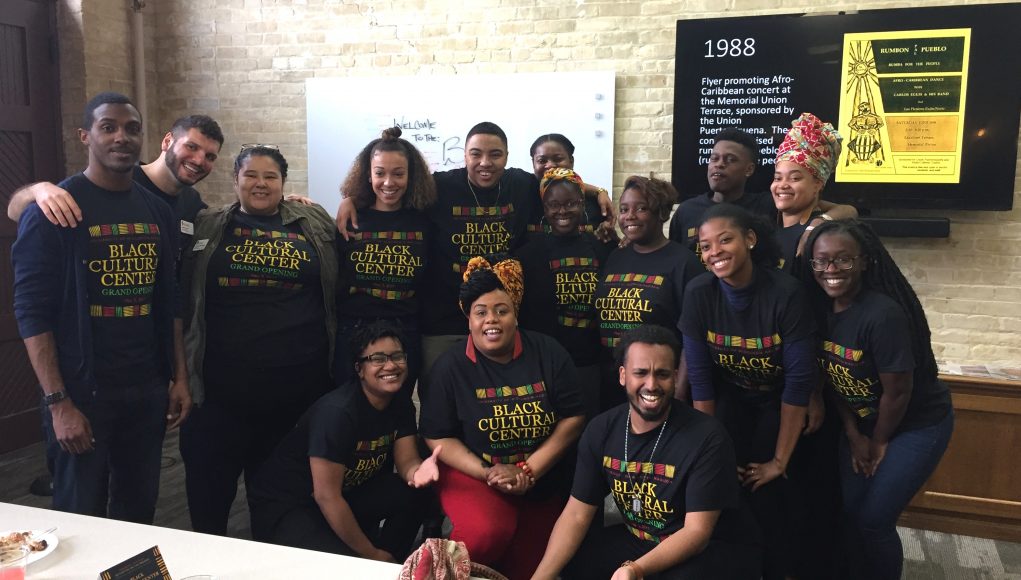 The black community came together on Wednesday to celebrate the grand opening of the University of Wisconsin-Madison’s Black Cultural Center, marking a milestone for black students on campus. After numerous racial incidents on campus over the past couple of years, the Black Cultural Center will serve as an educational, social, and healing place for black Badgers.
The black community came together on Wednesday to celebrate the grand opening of the University of Wisconsin-Madison’s Black Cultural Center, marking a milestone for black students on campus. After numerous racial incidents on campus over the past couple of years, the Black Cultural Center will serve as an educational, social, and healing place for black Badgers.
The Black Cultural Center is located on the first floor at the Red Gym. The opening attracted over 700 attendees and comprised a full day of events in celebration of black culture on campus. Starting at 8:30 a.m., the opening celebration showed a timeline of UW-Madison’s black history, the West African art of Adinkra printmaking, a showing of a short film on the black student experience, and a series of student performances by the University Gospel Choir, ROOTZ Afro-Caribbean Dance Group, First Wave scholarship program, and the National Pan-Hellenic Council, a collective of historically black Greek organizations that performed a Greek unity step performance.
The idea of the Black Cultural Center was pushed after the 2014 Black Lives Matter protests, said Karla Foster, the Interim Program Coordinator for the Multicultural Student Center. Foster helped motion and construct the Black Cultural Center with the support of the UW Administration and the community of color. Foster said this center symbolizes that black students are acknowledged by UW and is a center open for all students to socialize and to learn.
“It’s so easy for black students on this campus to feel invisible; to not feel comfortable or safe,” Foster said. “That’s why it’s important they have a space they can come to, to relax and be themselves, and come into who they are. They can become more empowered to go back out on campus and to continue the work that they’re doing for themselves. It’s important that they can go to a space where they see a reflection of themselves.”

For many students, the Black Cultural Center means joy and a long awaited safe space. Egal Warsame, a senior and PEOPLE scholar from Milwaukee and a part of the Student Advisory Board for the center, said in an interview with Madison365 he was overjoyed to see this space come to life in his last year at UW-Madison.
“It means a lot of joy and happiness. My freshman year on this campus I remember a distinct moment when one of my friends who used to go here, his dad said to him, ‘Where is the black student space?’ And we realized, that don’t exist. To see it happen here in my final year leaving this university it brings me so much happiness. The thing that I wished for actually happened, I got to witness it. Not as an alum but as a student,” Warsame said.
Although Warsame acknowledges the importance of bringing together students of color through the Multicultural Student Center, the Black Cultural Center is the only space on campus that is free of anti-blackness or colorism. He believes there should be a space that acknowledges the contributions that black students have made on campus.
For other students, the space means a place to simply exist. Penda Smith, a First Wave scholar and freshman, believes other spaces that put black students and students of color in the same place is a form of “erasure” for black students and that the space like the Black Cultural Center is needed just for black students. Smith performed a spoken word piece at the opening of this center as a tribute to her First Wave cohort and to celebrate black culture.
“It started with radically imagining something. What if systemic oppression didn’t exist; what does that even look like? So that was hard imagining what it looked like. So I took specific lines from my cohort members and basically was like, ‘Now black don’t crack’ or we know this because police brutality is dying,” Smith said.
With the opening of the Black Cultural Center, many look forward to utilizing the space and the future of it. Foster hopes the space becomes what students need it to be that changes with the time and the students that are here.




























